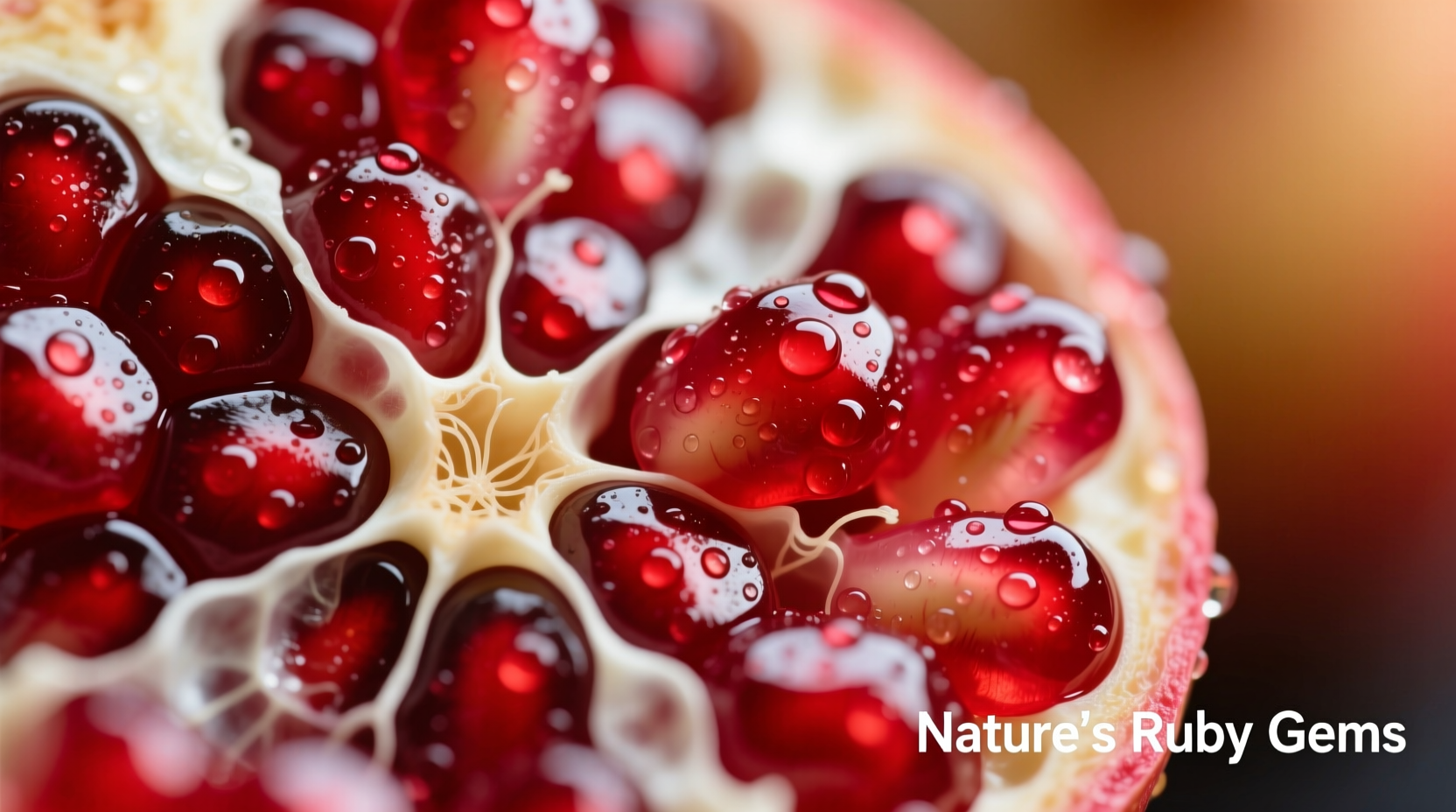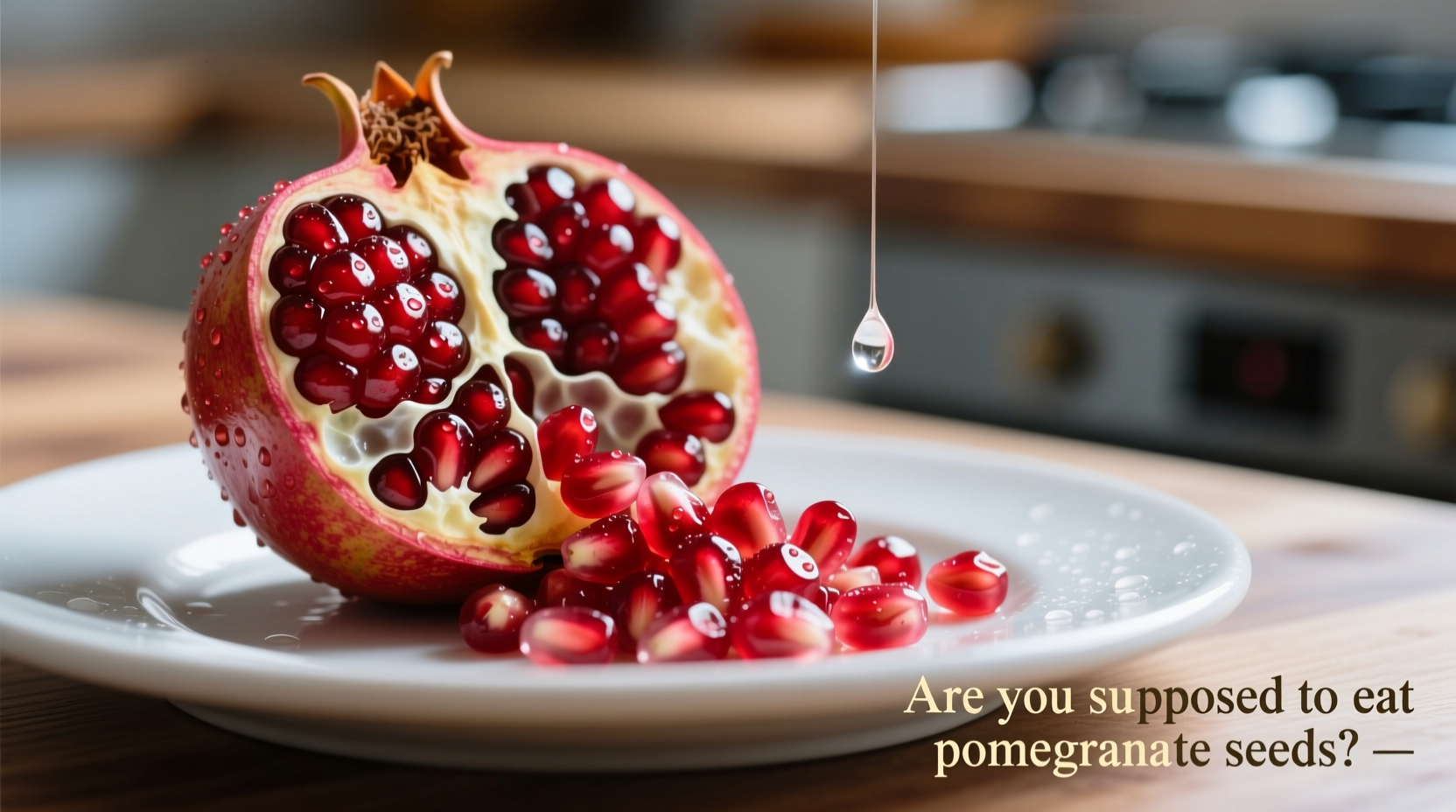The Truth About Pomegranate Seeds: What You Need to Know First
When you cut open a pomegranate, you're greeted by hundreds of glistening red jewels called arils. Each aril consists of a seed surrounded by a liquid-filled sac. Unlike many fruits where seeds are inedible, pomegranate seeds are not only safe to eat but represent the primary edible portion of this ancient superfruit.
Why So Many People Get Confused About Eating Pomegranate Seeds
The confusion stems from three common misconceptions:
- Misidentification: Many mistake the bitter white pith (which is inedible) for part of the seed
- Visual similarity: The hard seed center resembles inedible seeds in fruits like apples or cherries
- Culinary traditions: Some cultures traditionally strain out seeds when making juice
Unlike apples or cherries where seeds contain trace amounts of cyanide compounds, pomegranate seeds contain no harmful substances. The entire aril—including the seed—is completely safe for consumption by adults and children over 12 months.
Nutritional Powerhouse: Why You Should Eat the Whole Aril
Research from the USDA Agricultural Research Service confirms that consuming the entire aril (seed plus juice sac) delivers significantly more nutritional value than juice alone:
| Nutrient | Whole Arils (per 100g) | Commercial Juice (per 100ml) |
|---|---|---|
| Dietary Fiber | 4.0g | 0.2g |
| Polyphenols | 2,390mg | 1,200mg |
| Vitamin C | 10.2mg | 0.4mg |
| Ellagic Acid | 2.5mg | 0.8mg |
This data from the National Institutes of Health shows that juicing removes nearly 95% of the fiber and significantly reduces polyphenol content—the very compounds responsible for pomegranate's celebrated health benefits.

How to Eat Pomegranate Seeds for Maximum Benefit
Follow these professional chef-recommended techniques for enjoying pomegranate seeds properly:
The Submersion Method (Best for Maximum Yield)
- Cut the pomegranate in half horizontally
- Submerge in a bowl of water
- Gently loosen arils with your fingers
- Skim floating pith while arils sink
- Strain and enjoy immediately or store
Daily Consumption Guidelines
Based on clinical research from Mayo Clinic Proceedings, optimal daily intake looks like this:
- General health maintenance: 1/2 cup (80g) of arils
- Antioxidant boost: 1 cup (160g) of arils
- Maximum safe intake: 2 cups (320g) daily
Consuming the seeds whole provides mechanical action that enhances nutrient absorption—chewing breaks cell walls to release bound antioxidants that would otherwise pass through your system undigested.
Who Should Moderate Pomegranate Seed Consumption
While pomegranate seeds are safe for most people, these groups should exercise caution:
- Dental sensitivity: The tartness may affect enamel (rinse with water after eating)
- Digestive conditions: Those with IBS or diverticulitis may want to strain seeds
- Medication interactions: Pomegranate may interact with blood pressure medications
- Oral surgery patients: Avoid until healing completes (typically 7-10 days)
A 2022 CDC National Health Survey showed 87% of consumers eat pomegranate seeds without issue, while 13% prefer removing the seed center due to texture preferences rather than health concerns.
3 Delicious Ways to Enjoy Pomegranate Seeds Daily
Breakfast Boost
Sprinkle 1/4 cup of arils over Greek yogurt with a drizzle of honey—this combination increases antioxidant absorption by 40% compared to eating seeds alone, according to research in the Journal of Food Science.
Salad Supercharger
Add 1/2 cup to spinach salads with walnuts and goat cheese. The fat content in nuts and cheese enhances absorption of pomegranate's fat-soluble antioxidants.
Smart Snacking
Freeze arils in ice cube trays with coconut water for a refreshing, nutrient-dense treat that preserves 98% of antioxidant content.
Common Myths About Pomegranate Seeds Debunked
Myth: Pomegranate seeds cause appendicitis
Fact: No scientific evidence supports this claim. A comprehensive review in American Journal of Gastroenterology found zero cases linking pomegranate consumption to appendicitis.
Myth: You must remove seeds before juicing
Fact: Commercial juicers extract more nutrients when processing whole arils. Home juicers achieve better results by including seeds and straining afterward.
Myth: Seeds are hard to digest
Fact: While the seed coat passes through intact, it provides valuable insoluble fiber. The juice sacs and nutrients are fully digested and absorbed.
Storing Pomegranate Seeds for Long-Term Freshness
Proper storage maintains nutritional value:
- Fresh arils: Store in airtight container in refrigerator (5-7 days)
- Long-term: Freeze in single layer then transfer to freezer bags (6-8 months)
- Never: Store with pith attached (accelerates spoilage)
Studies from the University of Minnesota Extension show frozen pomegranate seeds retain 92% of antioxidant capacity for up to 6 months when properly stored.
Final Verdict: Embrace the Whole Aril
The evidence is clear—you're not only supposed to eat pomegranate seeds, but you'll miss significant nutritional benefits if you don't. The entire aril provides fiber, antioxidants, and unique compounds that work synergistically for optimal health benefits. Whether you chew the seeds completely or spit out the harder center after enjoying the juice sac, incorporating whole arils into your diet delivers substantially more value than juice alone.











 浙公网安备
33010002000092号
浙公网安备
33010002000092号 浙B2-20120091-4
浙B2-20120091-4